In the bustling world of restaurants, the last thing you want to worry about is an unwelcome guest – pests! From cockroaches to rodents, these unwanted visitors can wreak havoc on the cleanliness and reputation of your establishment. That’s why regular pest control is a crucial aspect of maintaining a hygienic and pest-free environment. In this article, we’ll explore the importance of staying vigilant against these pesky intruders and how it can safeguard the health and satisfaction of your customers. So let’s dive right in and discover the secrets to keeping your restaurant pest-free!
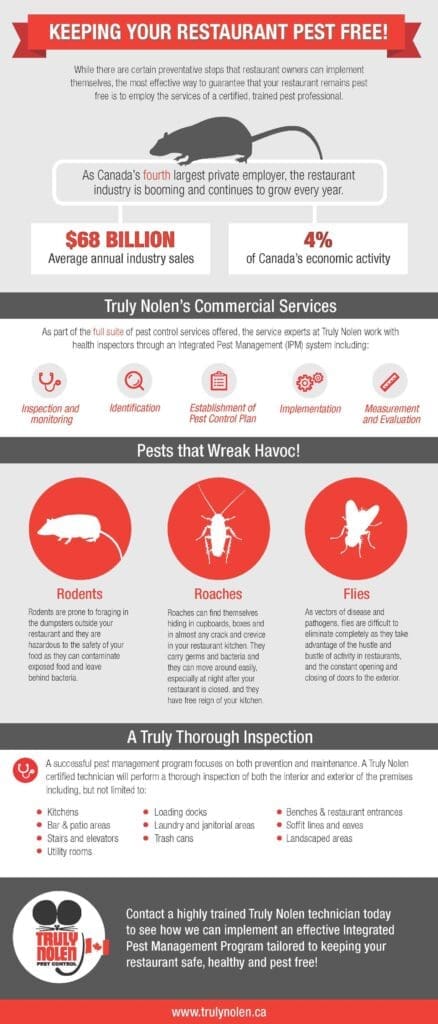
Preventing Food Contamination
Introduction
As a restaurant owner, it is important to prioritize the prevention of food contamination in your establishment. This not only ensures the safety of the food you serve to your customers, but also protects their health and safeguards your reputation. By implementing effective pest control measures and maintaining a clean and hygienic environment, you can prevent costly financial losses and legal consequences.
Ensure Food Safety
One of the key reasons to prioritize pest control in restaurants is to ensure the safety of the food you serve. pests such as rodents, cockroaches, and flies can contaminate your food with their droppings, urine, and bacteria they carry on their bodies. These contaminants can cause foodborne illnesses such as salmonella, E. coli, and listeria, posing a significant risk to your customers’ health. By implementing regular pest control measures, you can minimize the chances of food contamination and create a safe dining experience for your customers.
Protect Customers’ Health
The health and well-being of your customers should be a top priority for your restaurant. By proactively implementing pest control measures, you can prevent the transmission of diseases and reduce the risk of your customers getting sick. Pests are known carriers of various diseases, including salmonellosis, typhoid fever, and dysentery. By eliminating pests and maintaining a clean environment, you can protect the health of your customers and maintain their trust in your establishment.
Preserve Reputation
Word spreads quickly in today’s interconnected world, especially when it comes to negative experiences at restaurants. One incident of pests in your restaurant can quickly damage your reputation and lead to negative online reviews and a decrease in customers. By implementing regular pest control practices, you can ensure that pests do not become an issue in your establishment, protecting your reputation and maintaining a positive image in the eyes of your customers.
Prevent Financial Losses
Pest infestations can lead to significant financial losses for restaurants. Contaminated food may need to be discarded, resulting in wasted inventory and financial losses. Additionally, remediation and repair costs can quickly add up if pests have caused damage to your building or kitchen equipment. By investing in regular pest control, you can prevent these financial losses and maintain a healthy bottom line for your business.
Compliance with Health Regulations
Adhere to Local Laws
Complying with local health regulations is not only a legal obligation but also essential for the success and reputation of your restaurant. Many health departments require restaurants to have effective pest control measures in place. By adhering to these laws, you not only avoid legal consequences but also demonstrate your commitment to maintaining a safe and clean environment for your customers.
Maintain Consistent Inspection Ratings
Regular inspections by health departments are common in the restaurant industry. These inspections evaluate various aspects of your establishment, including pest control practices. By consistently maintaining high inspection ratings, you can instill confidence in your customers and reassure them of your commitment to food safety. Proper pest control practices are crucial for achieving and maintaining these high ratings.
Avoid Penalties and Legal Consequences
Failure to comply with health regulations can result in penalties, fines, and even legal consequences. These penalties can vary depending on the severity of the violation and may result in temporary or permanent closure of your establishment. By prioritizing pest control, you can avoid these penalties, protect your business, and ensure the continued operation of your restaurant.
Preventing Structural Damage
Pests and their Damaging Effects
Pests not only pose a threat to food safety but also to the structural integrity of your establishment. Termites, for example, can cause significant damage to wooden structures, leading to costly repairs and renovations. Additionally, rodents and insects can chew through electrical wires, causing potential fire hazards. By implementing effective pest control measures, you can protect your restaurant’s infrastructure and prevent damage that could disrupt your operations.
Protecting Building Integrity
Your restaurant building represents a significant investment, and protecting its integrity is crucial for the long-term success of your business. Pests such as termites, ants, and cockroaches can cause structural damage by burrowing into walls or damaging the foundation. By proactively addressing pest infestations, you can prevent damage to your building and avoid costly repairs that could potentially disrupt your business.
Avoid Costly Repair and Renovation
Repairing or renovating your restaurant due to pest damage can be a costly endeavor. From repairing walls and structures to replacing damaged electrical wiring or plumbing, the expenses can quickly add up. By investing in regular pest control, you can avoid these costly repairs and renovations, ensuring that your financial resources are allocated towards more important aspects of your business.
Maintaining a Clean and Hygienic Environment
Creating a Positive Dining Experience
Maintaining a clean and hygienic environment is crucial for creating a positive dining experience for your customers. A pest-free environment ensures that your customers can focus on enjoying their meal without the distractions and discomfort caused by pests. By implementing regular pest control practices, you can create an environment that is inviting, hygienic, and conducive to an enjoyable dining experience.
Attracting Customers
Customers today have a wide range of dining options, and their choice of restaurant often depends on factors such as cleanliness and hygiene. A pest-free restaurant sends a strong message to potential customers that you prioritize their health and well-being. By maintaining a clean and hygienic environment through regular pest control, you can attract more customers and encourage repeat business.
Preventing Negative Reviews
Negative online reviews can significantly impact your restaurant’s reputation and discourage potential customers from dining at your establishment. Pests are a common complaint among restaurant-goers, and a single incident can lead to negative reviews that tarnish your image. By preventing pest infestations through regular pest control, you can avoid these negative reviews and maintain a positive online presence.
Ensuring Employee Satisfaction
A clean and pest-free working environment is not only important for your customers but also for your employees. By implementing regular pest control measures, you can create a safe and comfortable workspace for your staff. This not only enhances their job satisfaction but also improves productivity and morale. Employees will appreciate working in an environment where they do not have to worry about pests or their associated health risks.
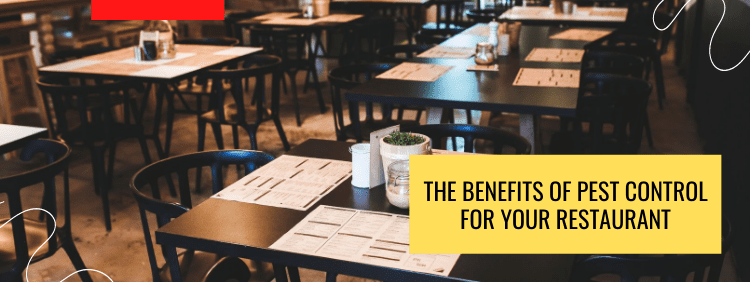
Preventing Pest-Borne Diseases
Common Diseases Transmitted by Pests
Pests are known carriers of various diseases that can be transmitted to humans. For example, rodents can spread diseases such as leptospirosis, hantavirus, and salmonellosis. cockroaches can carry pathogens that cause asthma and allergies. Mosquitoes can transmit diseases such as dengue fever, Zika virus, and West Nile virus. By preventing pest infestations, you can minimize the risk of these diseases spreading in your restaurant.
Protecting Staff and Diners
Ensuring the health and safety of your staff and customers is vital. Pests can directly harm both your employees and diners if they come into contact with contaminated areas or food. By implementing effective pest control measures, you can safeguard the well-being of your staff and customers, reducing the risk of them contracting diseases or illnesses associated with pests.
Reducing Liability Risks
Failure to address pest infestations can increase your liability risks as a restaurant owner. If a customer or employee falls ill due to a pest-related issue in your establishment, you may be held legally responsible. By prioritizing pest control and maintaining a pest-free environment, you can minimize your liability risks and provide a safe dining experience for all.
Preserving Food Quality and Stock
Pests as Contaminants
Pests can contaminate food products and ingredients, rendering them unsafe for consumption. Their droppings, urine, and hairs can easily find their way into food storage areas or preparation surfaces, leading to foodborne illnesses. By implementing regular pest control measures, you can prevent these contaminants from compromising the quality and safety of your food.
Prevent Food Spoilage and Wastage
Pests can cause significant food spoilage by chewing through packaging, contaminating food, and infesting storage areas. The presence of pests can result in the loss of inventory and wasted food products. By effectively managing and preventing pest infestations, you can minimize food spoilage, reduce financial losses, and ensure that your stock remains fresh and of high quality.
Avoid Financial Loss and Reputational Damage
Food spoilage caused by pests not only results in financial losses but also damages your restaurant’s reputation. Serving spoiled or contaminated food can lead to negative reviews, loss of customer trust, and a decline in business. By prioritizing pest control and maintaining the quality of your food, you can protect your reputation and avoid financial repercussions.
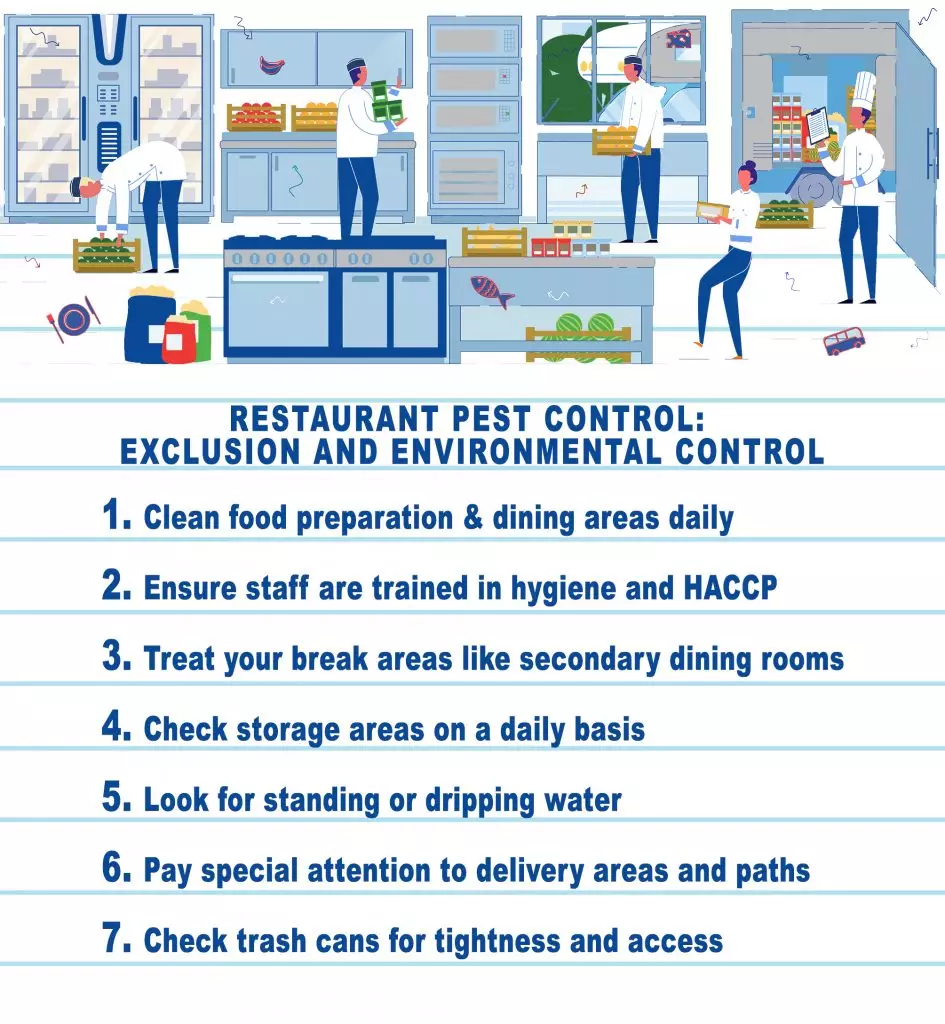
Protecting Kitchen Equipment and Supplies
Pests’ Impact on Equipment
Pests can cause damage to your kitchen equipment and supplies, resulting in costly repairs or replacements. For example, rodents can chew through electrical wires or damage appliances, leading to malfunctions and potential fire hazards. By implementing pest control measures, you can prevent pests from causing damage to your valuable equipment.
Preventing Damage and Malfunction
Damage to kitchen equipment can disrupt your restaurant’s operations and lead to unnecessary downtime. Leaky pipes, damaged electrical wiring, or malfunctioning appliances can impact the efficiency of your kitchen and affect the quality of your food. By addressing pest infestations promptly and effectively, you can prevent equipment damage and avoid interruptions in your daily operations.
Reducing Maintenance and Replacement Costs
Repairing or replacing damaged kitchen equipment can be costly and impact your restaurant’s budget. By investing in regular pest control, you can minimize the risk of equipment damage and reduce the need for expensive repairs or replacements. This allows you to allocate your financial resources towards other aspects of your business and avoid unexpected expenses.
Promoting Employee Safety and Morale
Preventing Accidents and Injuries
A pest-infested environment can pose potential risks and hazards to your employees. For example, rodents can create trip hazards by chewing through wires, while insects such as bees or wasps can cause allergic reactions and sting your staff. By prioritizing pest control, you can create a safe working environment and minimize the risk of accidents and injuries.
Eliminating Fear and Discomfort
Working in an environment infested with pests can cause fear and discomfort among your employees. This can negatively impact their morale, job satisfaction, and overall well-being. By implementing regular pest control measures, you can eliminate these concerns and create a workspace where your employees feel safe, comfortable, and motivated.
Boosting Productivity and Job Satisfaction
A clean and pest-free working environment has a positive impact on employee productivity and job satisfaction. By ensuring that pests are not a concern in the workplace, you can create a conducive atmosphere where your employees can focus on their tasks without distractions. This promotes efficiency, boosts morale, and ultimately contributes to the success of your restaurant.
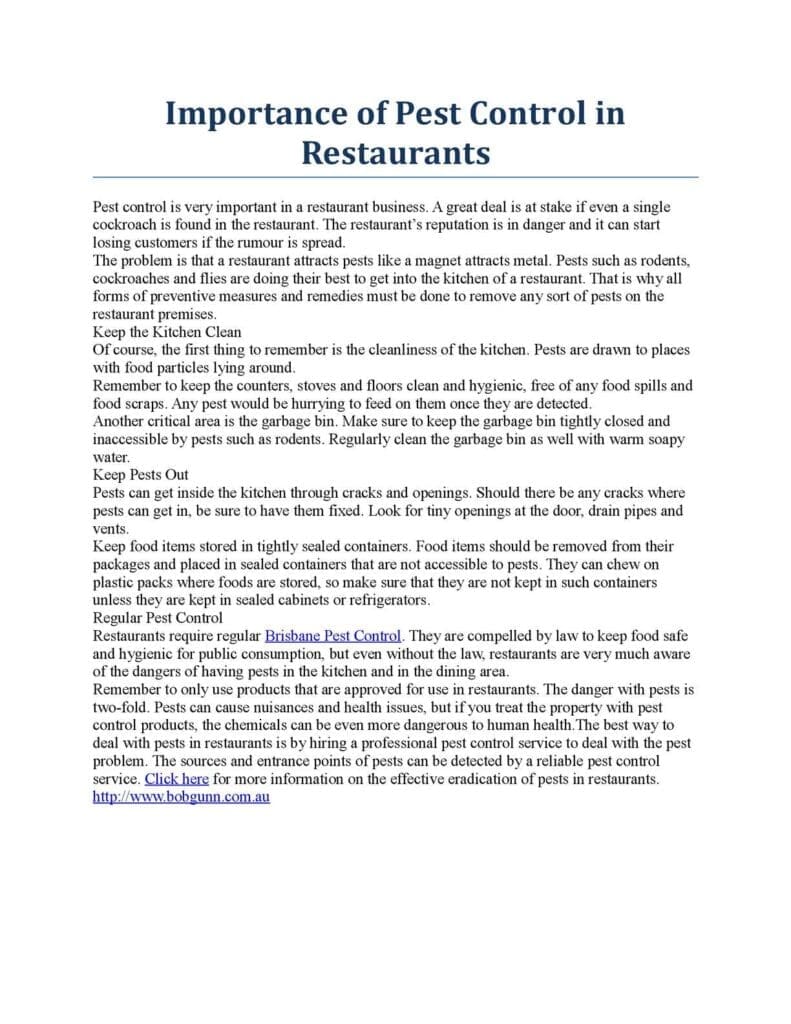
Avoiding Pest-Induced Business Interruptions
Pests as Culprits for Closures
Pest infestations can lead to temporary or even permanent closure of your restaurant. Health departments may require closure until the pest problem is resolved, resulting in significant financial losses and damage to your reputation. By proactively implementing pest control measures, you can avoid business interruptions and ensure a continuous and uninterrupted operation.
Minimizing Downtime
Downtime caused by pest-related issues can disrupt your restaurant’s operations and lead to revenue loss. Whether it’s closure for pest control treatments, repairs due to pest damage, or addressing the fallout from negative online reviews, any interruption in your business can have financial implications. By prioritizing pest control, you can minimize downtime and maintain a steady flow of operations.
Protecting Revenue
Pest infestations can directly impact your restaurant’s revenue by driving away customers and potentially causing closure. Negative experiences related to pests can lead to a decline in customer numbers and reduced revenue. By investing in regular pest control, you can protect your revenue stream by ensuring a positive dining experience for your customers and maintaining their loyalty.
Sustainable Pest Management Practices
Implementing Integrated Pest Management (IPM)
Integrated Pest Management (IPM) is a holistic and environmentally friendly approach to pest control. It involves the use of multiple methods, including prevention, monitoring, and targeted treatments, to manage pests while minimizing the use of harmful chemicals. By implementing IPM practices, you can effectively control pests in a sustainable manner and contribute to environmental preservation.
Reducing Reliance on Harmful Chemicals
Traditional pest control methods often rely on the use of harmful chemicals, which can have adverse effects on the environment and human health. By adopting sustainable pest management practices, you can reduce the reliance on these chemicals and opt for safer alternatives. This not only protects the environment but also ensures the well-being of your staff, customers, and the wider community.
Contributing to Environmental Preservation
Implementing sustainable pest management practices aligns with the global movement towards environmental preservation. By reducing the use of pesticides and promoting natural pest control methods, you can contribute to the preservation of ecosystems and protect biodiversity. Additionally, embracing sustainable practices can enhance your restaurant’s image and attract eco-conscious customers who appreciate your commitment to the environment.
In conclusion, prioritizing regular pest control in restaurants is vital for various reasons. From ensuring food safety and protecting customers’ health to preserving reputation and preventing financial losses, effective pest control measures play a significant role in the success of your establishment. By complying with health regulations, preventing structural damage, maintaining a clean and hygienic environment, preventing pest-borne diseases, preserving food quality, protecting kitchen equipment, promoting employee safety and morale, avoiding business interruptions, and implementing sustainable practices, you can create a pest-free environment that fosters a positive dining experience and supports the long-term success of your restaurant.
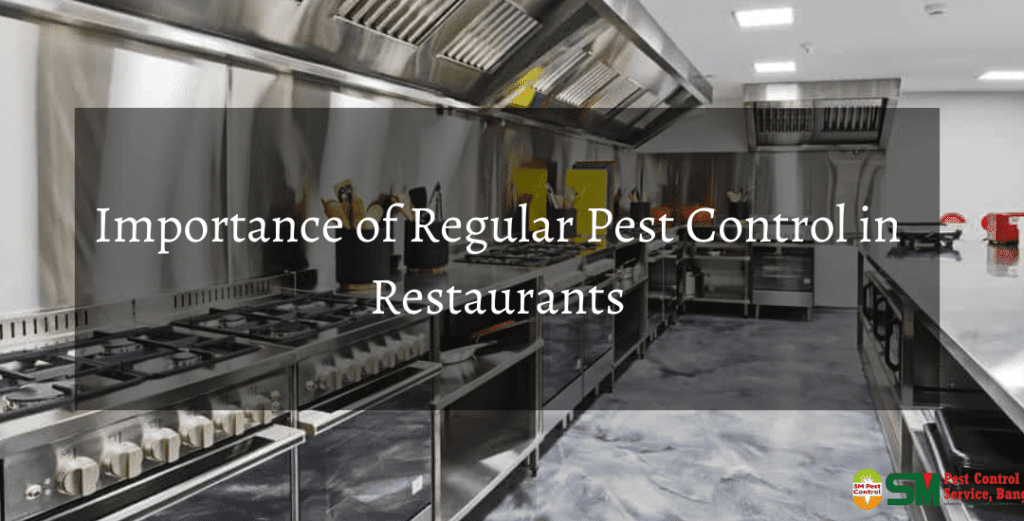

I am Randy, the author behind PestControld.com. Drawing from decades of experience, I aim to provide valuable insights, expert advice, and practical recommendations to help you make informed decisions when assessing viable pest control solutions.